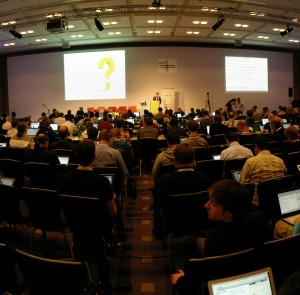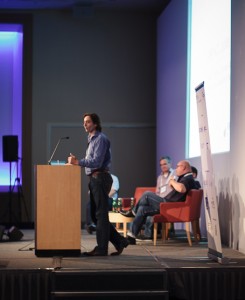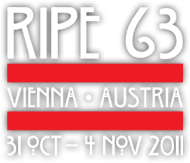409 attendees checked in so far!
Address Policy Working Group Session
Emilio Madaio, RIPE NCC Policy Development Officer, gave on overview of “Current Policy Topics” and the “Policy Development Office Activities”. Alex le Heux, RIPE NCC, continued with “Feedback from RIPE NCC Registration Services”, showing how the implementation can take from days to years.
 The APWG co-Chairs announced their intention to declare consensus on proposal 2011-02, “Removal of multihomed requirement for IPv6 PI”. 2011-04, “Extension of the Minimum Size for IPv6 Initial Allocation”, was presented and discussed: it was agreed that extending an IPv6 allocation from a /32 to a /29 should not be used exclusively for one transitioning technique. Proposal 2011-05, “Safeguarding future IXPs with IPv4 space”, was presented by Andy Davidson and received some support in the room after receiving a lot of support on the mailing list. The wording will be updated and then discussion will continue.
The APWG co-Chairs announced their intention to declare consensus on proposal 2011-02, “Removal of multihomed requirement for IPv6 PI”. 2011-04, “Extension of the Minimum Size for IPv6 Initial Allocation”, was presented and discussed: it was agreed that extending an IPv6 allocation from a /32 to a /29 should not be used exclusively for one transitioning technique. Proposal 2011-05, “Safeguarding future IXPs with IPv4 space”, was presented by Andy Davidson and received some support in the room after receiving a lot of support on the mailing list. The wording will be updated and then discussion will continue.
Dave Wilson, HEAnet, gave an overview “On Inter-RIR Transfers” and asked for discussion on whether we need an inter-RIR transfer policy. The RIPE NCC was requested to evaluate the current transfer policy. The community was encouraged to discuss on the AP mailing list whether a transfer policy for inbound addresses from other RIRs is necessary. Rob Blokzijl introduced his initiative for the “IPv4 Maintenance Policy” document. The document will be sent to the mailing list shortly and feedback is encouraged. Shane Kerr, ISC, was then invited to explain the conclusions from yesterday’s IPv6 WG session about IPv6 renumbering: some difficulties were highlighted and more results will be posted in the mailing list. The last item on the agenda was a review of the withdrawn policy 2008-08, “Initial Certification Policy in the RIPE NCC Service Region”. The difference between policy and the “Certification Practice Statement” was clarified.
Routing Working Group Session
Geoff Huston, APNIC, presented the mystery of “The Flat World of BGP” – while the table grows, the number of BGP updates does not grow significantly. Thomas Mangin presented on exaBGP and asked for feedback. Randy Bush, IIJ, presented on the “Impact of the Tohoku Earthquake on Japanese ISPs” and concluded this was a boring event; the Internet worked around failures. He also presented on the CPU load of BGPSEC. Daniel Karrenberg, RIPE NCC, asked for input on the usefulness of RIS routing beacons. The responses were that they were useful. There was an action on the RIPE NCC to publish the IPv6 Routing Recommendations document.
ENUM Working Group Session
The ENUM WG started with Wolfgang Nagele, RIPE NCC, giving an update of the RIPE NCC’s ENUM service. Patrik Fältström, Cisco, joined the session by telephone to give a short presentation called “User ENUM in +46”. The third presenter was Lino Santos, reporting about ENUM progress in Portugal. Most of the WG session was covered by an interesting panel discussion with ENUM experts from various countries – Austria, Portugal, UK, Czech Republic, Sweden – and a speaker from TERENA. The discussion was focused around why ENUM is not terribly successful and if ENUM itself is a service or if it is an underlying technology on which services can be based. One of the conclusions was that it would good if all ENUM operators would collaborate more rather than acting like competitors. An action was assigned to contact all ENUM operators between now and RIPE 64.
RIPE NCC Services Working Group Session
 The RIPE NCC Services Working Group was the final session of the day. Following an introduction to the newly composed Senior Management team by Axel Pawlik, RIPE NCC Managing Director, there was an update from the RIPE NCC Senior Managers on the organisation’s various activities, priorities and developments. Paul Rendek, RIPE NCC Director of External Relations, then summarised the results of the RIPE NCC Membership and Stakeholder Survey 2011, and Andrea Cima, Registration Services Manager, provided an update on the RIPE NCC’s preparation for the distribution of the last remaining IPv4 address space and the associated business processes. Ingrid Wiijte, Registration Services Assistant Manager, reported on the progress of the RIPE NCC’s project on Contractual Relationship Requirements for End Users. Finally, Daniel Karrenberg, RIPE NCC Chief Scientist, reported on the development and future plans for RIPE Atlas.
The RIPE NCC Services Working Group was the final session of the day. Following an introduction to the newly composed Senior Management team by Axel Pawlik, RIPE NCC Managing Director, there was an update from the RIPE NCC Senior Managers on the organisation’s various activities, priorities and developments. Paul Rendek, RIPE NCC Director of External Relations, then summarised the results of the RIPE NCC Membership and Stakeholder Survey 2011, and Andrea Cima, Registration Services Manager, provided an update on the RIPE NCC’s preparation for the distribution of the last remaining IPv4 address space and the associated business processes. Ingrid Wiijte, Registration Services Assistant Manager, reported on the progress of the RIPE NCC’s project on Contractual Relationship Requirements for End Users. Finally, Daniel Karrenberg, RIPE NCC Chief Scientist, reported on the development and future plans for RIPE Atlas.
PGP Key-Signing Party
The PGP Key-Signing Party has been a regular feature at the last few RIPE Meetings, and RIPE 63 was no exception. While cryptography ensures the secrecy of communication, it is important to establish a “web of trust” so that the authenticity of the involved parties is also known with a high degree of confidence. The RIPE Meeting presents an ideal opportunity for attendees to meet, exchange, verify and sign each other’s public keys. Yesterday’s Key-Signing Party was attended by 10-15 people and will be continued at future RIPE meetings.

